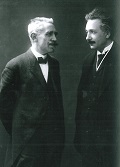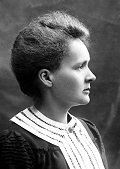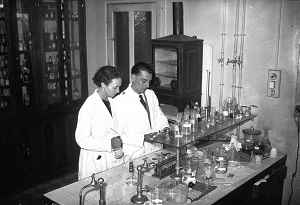About the archives
The « Journal de Physique » Archive (1872 – 1997)
History
The Journal de Physique Théorique et Appliquée was created in 1872 by Charles d’Almeida “to breathe new life into physics” and “to invigorate teaching, to stimulate the spirit of research and provoke new discoveries”. It was the first “review” devoted exclusively to physics.
In 1920, La Société du Journal de Physique et Le Radium was founded. Early shareholders included Marie Curie, Jean Perrin, Albert 1er the Prince of Monaco, Antoine Béclère who created the first radiology laboratory in Paris and Louis Lumière of the Lumière brothers. Louis de Broglie and Paul Langevin sat on the Conseil d’Administration (Board of Directors).

The purpose of the new organisation was to resume publishing the Journal de Physique Théorique et Appliquée following its merger with Le Radium under the new name of Le Journal de Physique et Le Radium. The new journal was overseen by the Société Française de Physique and housed in its offices in the Rue de Rennes (1920-1966) and the Rue Croulebarbe (1966-1978).

Paul Langevin

Paul Langevin (famous for Langevin Dynamics and the Langevin Equation) was the first and long-standing Scientific Director of the Journal de Physique. From 1920 to 1963, Series VI-VIII of the Journal de Physique were published under his direction. In his first Editorial, or Avertissement, Paul Langevin wrote of “l’amour de notre science”.
Later, his son, Jean Langevin, also became Editor-in-Chief of the Journal de Physique. In 1972, he published a retrospective Editorial, Cent ans de Journal de Physique. Even then, he was convinced that “The published volumes of the Journal de Physique reflect accurately the life of physics during this last century.”
Marie Curie

Marie and Pierre Curie shared the 1903 Nobel Prize in Physics with Henri Becquerel for their research on radiation. In 1911, Marie Curie was awarded the Nobel Prize in Chemistry. Marie Curie was the first woman to be awarded a Nobel Prize, the first person to be awarded the prize twice and still the only person to receive the prize in two different scientific fields. Her work remains preserved within the Journal de Physique archives, including Sur le poids atomique du Radium.
Astrophysics
Reviews of articles published in other journals of the early twentieth century, such as the Comptes rendus de l'Académie des Sciences, the Annalen der Physik and The Astrophysical Journal, are preserved within the Journal de Physique archives. Astrophysics remains well-represented throughout the Journal de Physique archives right up to 1997.
"In astronomy, we tend to focus on the most recent findings which are often readily available to our researchers. However, it is equally important to provide access to legacy archives in order to understand the immense value of historical content. The availability of the Journal de Physique archive collection enables access to the rich past for contemporary researchers.”
Uta Grothkopf
Head of Library, Documentation, and Information Services Department
ESO - European Southern Observatory
Chemistry

Chemistry is also well-represented in the Journal de Physique archives from Ernest Rutherford (Nobel Prize in Chemistry, 1908) to Irène Joliot-Curie and Frédéric Joliot (Nobel Prize in Chemistry, 1935) to Ilya Prigogine (Nobel Prize in Chemistry, 1977).
Today

Denis Jérome, the experimental physicist who contributed to the discovery of superconductivity in organic conductive matter, was the last Editor-in-Chief of the Journal de Physique from 1991 to December 1997 when publication came to an end.
The Journal de Physique is one of the predecessor journals that now constitute some of the European Physical Journal titles, namely EPJ B, EPJ D, EPJ E, EPJ AP, EPJ ST and Europhysics Letters.
“The EDP Sciences archives remind us that science is multi-lingual, that language barriers are of our own making, and that they can quickly vanish. The pages of the Journal de Physique et Le Radium illustrate this and offer a source of inspiration – with their mix of French and English articles, their translated accounts of results published in other languages, and ultimately a commitment to allowing scientific ideas to cross geographical borders and time.”
Gaia Donati, Discovery through multi-lingual science archives, Research Information
“Les revues scientifiques anciennes sont une source de renseignements incontournables et indispensables. Elles sont des mines de renseignements, des filons vers des mondes disparus, et aujourd’hui de nouveaux terrains pour la recherche.”
Corinne Labat - Service Commun d'Etude et de Conservation des Collections Patrimoniales, Université Toulouse III-Paul Sabatier
En savoir plus (PDF)
Why an archive?
The Journal de Physique was created in 1872 by Charles d’Almeida « to breath new life into physics », « to invigorate teaching, to stimulate the spirit of research and provoke new discoveries ».
These objectives, though written in a somewhat old-fashioned manner, are still valid and could well be recited today.
More than 130 years on, the creators of the journal have achieved their objectives. France is today, in spite of some short-term difficulties, a leading scientific nation that has enriched the scientific patrimony of the world thanks to the efforts of its many generations of scientific researchers.
The journal has hence supported a rich and varied adventure with a content and format that has changed significantly over the years.
The finest French Physicists and many overseas researchers have published their findings in its pages, remarkable works have also been printed over the years, and it is not by accident that the journal is still active after so much time.
The creation of this on-line archive is in tune with current tendencies whereby the printed form of a journal is not considered as the primary reading source but more an archive in itself !! Researchers are more inclined to read scientific articles on their computer screens, printing a copy locally if required, rather than pay a visit to the in-house library.
For the historian of science, the archive provides an easy to use mine of information concerning the manner in which physics has been presented since 1872. It counts more than 300,000 pages in over 48,500 articles and represents a true scientific « monument », produced since 1872, within which the great names of physics may be found.
Above all, and perhaps most importantly, the archive will incorporate an index system for English key words, allowing English-speaking users to find articles via standard bibliographical search engines. The journal will hence open its doors to a vast international community.
Making available this extensive collection of articles will, on the one hand respect the wishes of its authors to best distribute their findings, and on the other, allow current active authors to give a new lease of life to their articles and promote the value of their work.
Jean-Marc Quilbé
EDP Sciences



